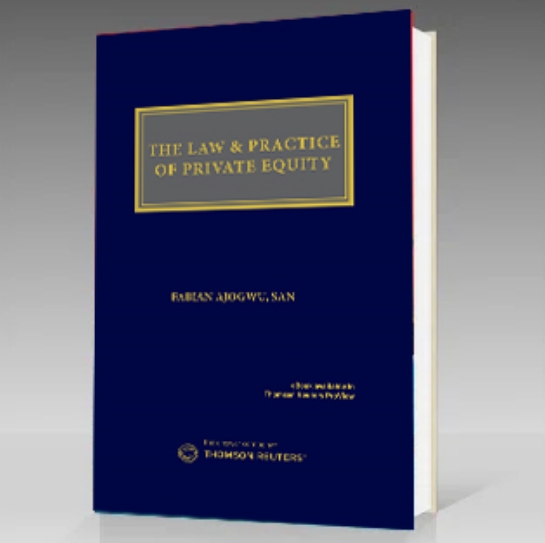I am pleased to write the foreword to this book, ‘The Law and Practice of Private Equity’ that discusses conceptual and practical issues relating to Private Equity in emerging markets.
For a long time now, different sources of funding have been available to companies and businesses as a means of raising capital to achieve the set objectives of the companies and return profit to the investors. Due to the peculiar nature or characteristic of each company, not all sources of funding might be available, appropriate or appealing to a particular company in that specific circumstance. It, therefore, behoves on the business to identify the particular funding option that is most suitable for it. This can only be done through an informed choice of what type of financing will be suitable for a particular purpose, which aligns with the vision of the company as well as serves the overall interests of the business. The book presents a practical approach for adopting Private Equity as a funding option for businesses drawing examples from businesses that have benefited through private equity. The book shows that Private Equity is an effective funding option for start-up businesses as well as businesses that cannot afford debt financing arising from the inability to meet the requirements of debt financing like lack of collateral.
This is a very unique book that deals with practical issues that are very important to emerging markets. This is because of the rise in Private Equity transactions in emerging markets as part of much needed Foreign Direct Investments (FDI). Many years ago, Private Equity was not as relevant as it is today. However, with the increasing need for infrastructure development, and the shift towards Private Equity deals and transactions particularly in Sub-Saharan Africa, this book ‘The Law and Practice of Private Equity’ provides the much needed practical information on Private Equity as a potent funding option that can fill the funding gap for some businesses and deliver profitability for the investors and owners of businesses.
As noted in the book, Private Equity is a major subsection of a much larger, multifarious part of the financial landscape known as the private markets.
The Law and Practice of Private Equity The concept refers to a form of financing where capital is invested in a company, typically mature businesses in conventional industries, in return for equity. However, Private Equity is often confused with other funding options that may be available to businesses. The author, Professor Fabian Ajogwu SAN, skillfully deals with the concept of financing models, expertly dispelling any confusion or misunderstanding between Private Equity and other financing options and other sources of finance that may be available to businesses.
It is pertinent to note that the author showcases the other financing options available to business and the peculiarity of each financing option. The author is right to espouse Private Equity as undertaking investments in equity and quasi-equity mainly (though not exclusively) in non-listed companies in order to generate high risk-adjusted returns over a specific period of time, by backing entrepreneurs. The purpose of such investments is to provide financial stability for the portfolio companies and improve company management.
The book can be described as a “magnum opus” by the Learned Professor in the field of Investment and Financing Sources with in-depth research and analysis of concepts, legal principles, relevant laws and legislation. The author does not limit himself to local laws and scenarios alone, he examines and analyses Private Equity transactions and deals in other developed and developing countries and jurisdictions. The author should be commended for his insightful analysis of the making of Private Equity deals and by providing practical instances of Private Equity deals within and outside Nigeria. It is indeed a show of hard work and pursuit of excellence in this masterpiece.
The Law and Practice of Private Equity is worthy of commendation for its insightful analysis of deal-making in private equity and corporate governance issues arising from private equity transactions. The Learned Author provides a practical step by step guide to successful deal-making applying private equity, including due diligence which is at the soul of private equity transactions. The book not only answers the question of what Private Equity is, but also deals exhaustively with the question of “how”
Foreword to structure successful private equity deals from the negotiation to the exit stage. The book can best be described as years of practical experience reduced to a book. With close to thirty years of legal practice experience (including structuring private equity deals and legal advisory services in private equity transactions) as well as teaching and research experience, it is not surprising to see that this book portrays practical principles and recommendations that will assist the practitioner in private equity deals and transactions.
The Learned Author, Professor Fabian Ajogwu, SAN, has produced a reference book for the Private sector, public sector, banking sector, technology companies, government and regulators, judicial officers, legal practitioners, academics, students, the media and all who wish to see the continued growth of private equity transactions in emerging markets and indeed Sub-Saharan Africa. I must commend this practice guide – The Law and Practice of Private Equity and this invaluable addition to the body of literature on Private Equity in such an area where little or no research exists in Nigeria.
Derrick Roper
Chief Executive Officer
Novare Equity Partners (Pty) Ltd
Cape Town, South Africa
June 23, 2020


